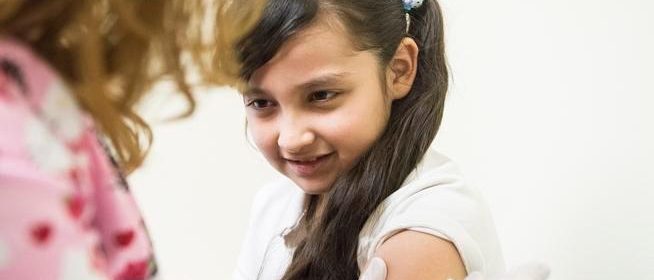Colorado kindergarten vaccinations were up pre-pandemic, but officials worry for coming year

More kindergarteners in Colorado were vaccinated against measles and other contagious diseases during the school year that ended in June, but state officials are worried that progress could reverse as the pandemic continues.
About 91% of kindergarten students in Colorado got the vaccine protecting against measles, mumps and rubella last school year, up from about 87% the year before, said Jill Hunsaker Ryan, executive director of the Colorado Department of Public Health and Environment, during a call with reporters Friday.
The department has a goal of 95% coverage by the end of the 2022-2023 school year, she said.
“Our ultimate goal is complete herd immunity,” she said.
Herd immunity is when a large enough percentage of the population is vaccinated that outbreaks can’t take off, because the virus can’t easily leap from one host to the next. It’s particularly important for the small percentage of people who can’t get vaccinated because of a health condition. Measles is highly contagious, with each infected person passing the virus to 12 or more other people, so the vaccination rate also needs to be high to stop it, Ryan said.
The vaccination rates for kindergarten students also increased for the diphtheria, tetanus and pertussis shot, as well as for hepatitis B, polio and chickenpox, Ryan said. That may partially reflect having a “captive audience” when parents bring their children in for the measles vaccine, she said.
Fewer kids got vaccinated between mid-March and mid-July than did last year, though, threatening that progress, said state epidemiologist Rachel Herlihy. Reports to the state vaccine registry decreased about 19%, raising the risk that Colorado could have outbreaks of vaccine-preventable diseases while still dealing with COVID-19, she said.
Even before the pandemic, some areas had worrisome vaccination rates, Herlihy said. In some schools, every child is immunized, while in others, the rate is as low as 15%, she said.
“Where there are pockets of undervaccination, that’s a risk for outbreaks,” she said.
Kids still need to get the required vaccines for school attendance, even if they attend remotely, said Haley Houtchens, a school nurse consultant with Children’s Hospital Colorado.
“We don’t want to see resurgences of measles, mumps, rubella,” she said.
It also will be important that as many people as possible, including kids, get the annual flu shot, Ryan said. While flu is less deadly than COVID-19, thousands of people are hospitalized each year with complications. School-aged kids are less likely to suffer complications than older adults, but they’re very effective at spreading flu viruses, she said.
“We don’t want hospital capacity overwhelmed by these two diseases,” Ryan said of the flu and COVID-19..
Shots are available for free to children who are uninsured, underinsured, eligible for Medicaid, or a member of an American Indian tribe through the Vaccines for Children program. About 500 providers, including community health centers and some private practices, participate in the program.
Well-child visits are down since the pandemic hit Colorado, said Dr. Sean O’Leary, a professor of pediatrics on the University of Colorado’s Anschutz Medical Campus. Pediatricians have used different tactics to prevent the coronavirus’ spread, including using telemedicine for parts of the visit that don’t need to be hands-on, and having separate spaces or hours for sick and well kids, but have reported some parents are still reluctant to come in.
Those visits are important now, not only to check for developmental issues, but to talk about what children are feeling and what they can do to stay safe during a stressful time, he said.
“This is a hard time for all of us, but it’s particularly hard for children,” he said.
To look up your school’s vaccination rate, visit CoVaxRates.org.
Source: Read Full Article